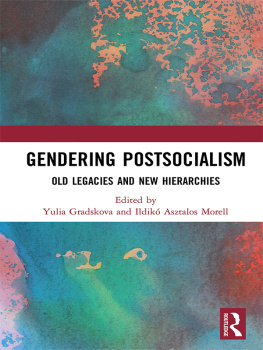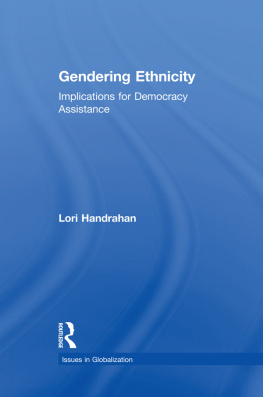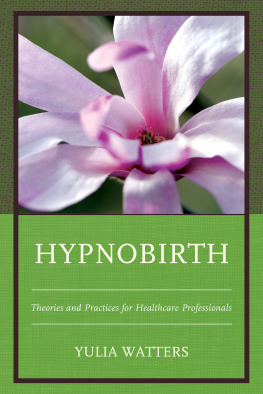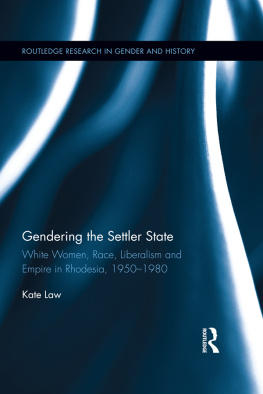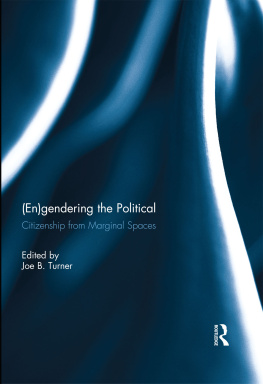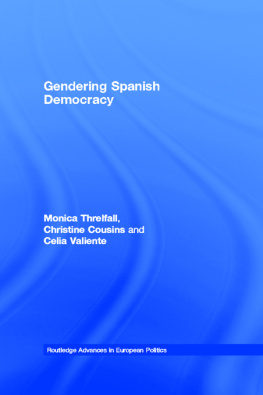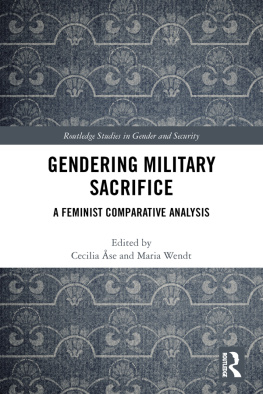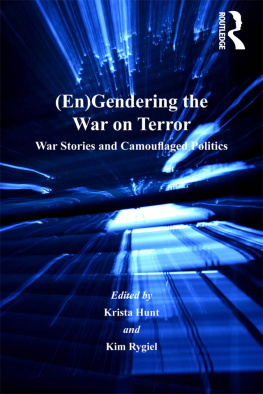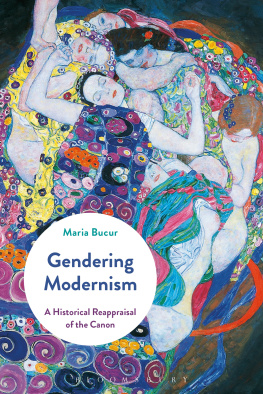Yulia Gradskova - Gendering Postsocialism: Old Legacies and New Hierarchies
Here you can read online Yulia Gradskova - Gendering Postsocialism: Old Legacies and New Hierarchies full text of the book (entire story) in english for free. Download pdf and epub, get meaning, cover and reviews about this ebook. year: 2018, publisher: Taylor & Francis (CAM), genre: Politics. Description of the work, (preface) as well as reviews are available. Best literature library LitArk.com created for fans of good reading and offers a wide selection of genres:
Romance novel
Science fiction
Adventure
Detective
Science
History
Home and family
Prose
Art
Politics
Computer
Non-fiction
Religion
Business
Children
Humor
Choose a favorite category and find really read worthwhile books. Enjoy immersion in the world of imagination, feel the emotions of the characters or learn something new for yourself, make an fascinating discovery.
- Book:Gendering Postsocialism: Old Legacies and New Hierarchies
- Author:
- Publisher:Taylor & Francis (CAM)
- Genre:
- Year:2018
- Rating:5 / 5
- Favourites:Add to favourites
- Your mark:
- 100
- 1
- 2
- 3
- 4
- 5
Gendering Postsocialism: Old Legacies and New Hierarchies: summary, description and annotation
We offer to read an annotation, description, summary or preface (depends on what the author of the book "Gendering Postsocialism: Old Legacies and New Hierarchies" wrote himself). If you haven't found the necessary information about the book — write in the comments, we will try to find it.
Yulia Gradskova: author's other books
Who wrote Gendering Postsocialism: Old Legacies and New Hierarchies? Find out the surname, the name of the author of the book and a list of all author's works by series.
Gendering Postsocialism: Old Legacies and New Hierarchies — read online for free the complete book (whole text) full work
Below is the text of the book, divided by pages. System saving the place of the last page read, allows you to conveniently read the book "Gendering Postsocialism: Old Legacies and New Hierarchies" online for free, without having to search again every time where you left off. Put a bookmark, and you can go to the page where you finished reading at any time.
Font size:
Interval:
Bookmark:

Gendering Postsocialism explores changes in gendered norms and expectations in Eastern Europe and Eurasia after the fall of the Berlin Wall. The dismantlement of state socialism in these regions triggered monumental shifts in their economic landscape, the involvement of their welfare states in social citizenship and, crucially, their established gender norms and relations, all contributing to the formation of the postsocialist citizen.
Case studies examine a wide range of issues across 15 countries of the post-Soviet era. These include gender aspects of the developments in education in Kazakhstan, Uzbekistan and Hungary, controversies around abortion legislation in Poland, migrant women and housing as a gendered problem in Russia, challenges facing womens NGOs in Bosnia, and identity formation of unemployed men in Lithuania. This close analysis reveals how different variations of neoliberal ideology, centred around the notion of the self-reliant and self-determining individual, have strongly influenced postsocialist gender identities, whilst simultaneously showing significant trends for a retraditionalising of gender norms and expectations.
This volume suggests that despite integration with global political and free market systems, the postsocialist gendered subject combines strategies from the past with those from contemporary ideologies to navigate new multifaceted injustices around gender in Eastern Europe and Eurasia.
Yulia Gradskova, Sdertrn University, Sweden, is a historian dealing with post-Soviet history. She is the co-author of Gender Equality on a Grand Tour (2017 with E. Blomberg, Y. Waldemarson, A. Zvinkliene) and the co-editor of And They Lived Happily Ever After (2012 with H. Carlbck and Zh. Kravchenko).
Ildik Asztalos Morell, sociologist from Mlardalen and Uppsala University (Sweden) with an interest in rural, gender and ethnicity studies of transition societies. She is the author of Emancipations Dead-End Roads (1999) and co-editor of Gender Regimes, Citizen Participation and Rural Restructuring (2008 with B. Bock).
Gendering Postsocialism
Old Legacies and New Hierarchies
Edited by Yulia Gradskova and Ildik Asztalos Morell

First published 2018
by Routledge
2 Park Square, Milton Park, Abingdon, Oxon OX14 4RN
and by Routledge
711 Third Avenue, New York, NY 10017
Routledge is an imprint of the Taylor & Francis Group, an informa business
2018 selection and editorial matter, Yulia Gradskova and Ildik Asztalos Morell; individual chapters, the contributors
The right of Yulia Gradskova and Ildik Asztalos Morell to be identified as the authors of the editorial material, and of the authors for their individual chapters, has been asserted in accordance with sections 77 and 78 of the Copyright, Designs and Patents Act 1988.
All rights reserved. No part of this book may be reprinted or reproduced or utilised in any form or by any electronic, mechanical, or other means, now known or hereafter invented, including photocopying and recording, or in any information storage or retrieval system, without permission in writing from the publishers.
Trademark notice: Product or corporate names may be trademarks or registered trademarks, and are used only for identification and explanation without intent to infringe.
British Library Cataloguing in Publication Data
A catalogue record for this book is available from the British Library
Library of Congress Cataloging in Publication Data
Names: Gradskova, Yulia, editor. | Asztalos Morell, Ildiko, editor.
Title: Gendering Postsocialism : old legacies and new hierarchies / edited by Yulia Gradskova and Ildiko Asztalos Morell.
Description: 1 Edition. | London ; New York : Routledge, [2018] | Includes index.
Identifiers: LCCN 2017050363 | ISBN 9781138296060 (hardback : alk. paper) | ISBN 9781315100258 (ebook)
Subjects: LCSH: Gender identity--Former communist countries. | Women--Former communist countries--Social conditions. | Sexual minorities--Former communist countries--Social conditions.
Classification: LCC HQ18.E852 G4596 2018 | DDC 305.309171/7--dc23
LC record available at https://lccn.loc.gov/2017050363
ISBN: 978-1-138-29606-0 (hbk)
ISBN: 978-1-315-10025-8 (ebk)
Roman Abramov is an Associate Professor; Candidate of Sciences in Theory, History and Methods of Sociology; and Deputy Head of the Analysis of Social Institutions Department, National Research University Higher School of Economics (Moscow, Russia). He is also a senior researcher at the Institute of Sociology, Russian Academy of Science. Abramovs main publications in English include Understanding Professionalism in the Soviet Union and Post-Soviet Russia: an Analytical Review, in The American Sociologist (2016); The History of Sociological Research on Occupations and Professions in the USSR 196080s: Ideological Frameworks and Analytical Resources, in SSRN. Series Social Science Research Network (2014); and Managerialism and the Academic Profession, in Russian Education and Society (2012). His research interests include the sociology of professions, memory studies, sociological theory, and the sociology of higher education.
Ildik Asztalos Morell is an Associate Professor in Sociology at Mlardalen University and senior research fellow at the Uppsala Centre for Russian and Eurasian Studies at Uppsala University. Her major interests include comparative gender research, the study of transition societies with a special focus on rural transformation during state socialism and in the emergence of capitalism, intersectional aspects of rural marginalisation and poverty, and Romani studies. Morell has published close to forty articles and book chapters and has been the co-editor of several volumes, most importantly Gender Regimes, Citizen Participation and Rural Restructuring (2008 with Bettina Bock), Gender Transitions in Russia and Eastern Europe (2005 with Helene Carlbck, Sara Rastbck, and Madeleine Hurd) and Attitudes, Poverty and Agency in Russia and Ukraine (2016 with Ann-Mari Stre).
Sanela Bajramovi Jusufbegovi is a PhD candidate in History at rebro University, Sweden, where she has taught since 2009. Her contribution in this anthology is based on her forthcoming thesis Hierarchical Sisterhood, which is focused on efforts by the Swedish foundation Kvinna till Kvinna to support womens peacebuilding in Bosnia and Herzegovina between 1993 and 2013. This research explores the advantages and dilemmas of transnational encounters between women in the context of development work done within the framework of international interventions. She has contributed chapters to publications in English and Swedish languages. Her research interests range from donor/recipient relations, wartime sexual violence, and womens activism in postwar Bosnia to methodological and ethical questions in the field of oral history.
Li Bennich-Bjrkman is the Johan Skytte Professor in Eloquence and Political Science at University of Uppsala, Sweden, and she was research director for six years at the Uppsala Centre for Russian and Eurasian Studies, Uppsala University. She has worked extensively on issues of political developments in the post-communist and post-Soviet countries, on life in exile and refugees, on creativity and research politics, and on integration. Presently, she is investigating conflict, gender, and masculinity in the South Caucasus. Her recent publications include Post-Communism, in SAGE
Font size:
Interval:
Bookmark:
Similar books «Gendering Postsocialism: Old Legacies and New Hierarchies»
Look at similar books to Gendering Postsocialism: Old Legacies and New Hierarchies. We have selected literature similar in name and meaning in the hope of providing readers with more options to find new, interesting, not yet read works.
Discussion, reviews of the book Gendering Postsocialism: Old Legacies and New Hierarchies and just readers' own opinions. Leave your comments, write what you think about the work, its meaning or the main characters. Specify what exactly you liked and what you didn't like, and why you think so.

